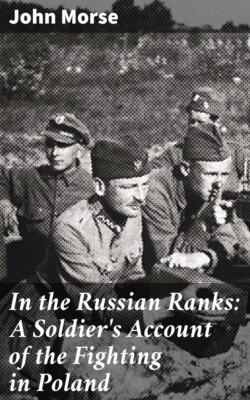Читать книгу In the Russian Ranks: A Soldier's Account of the Fighting in Poland - John Morse - Страница 7
На сайте Литреса книга снята с продажи.
ОглавлениеRUSSIAN ARTILLERY GOING INTO ACTION
Dying men made piteous appeals for drink. One poor fellow expired while we were in the act of attending to him. The horribly inhuman nature of the Germans was evinced by the circumstance that they had made prisoners of all the wounded who would probably recover, and count in their lists of capture; but had left the mortal cases (even their own) unattended, to linger out a dreadful and agonized end. Their lack of feeling was fiendish. They had not even endeavoured to alleviate the sufferings of the men thus abandoned: for we found one German groaning, and seemingly praying for succour, pinned down under a dead horse. He was not even dangerously hurt, and would, I think, recover under the treatment he would receive from the Russians. For though these northern men were often barbarous enough on the field of battle, they were never cruel to their prisoners, or to injured men, unless these were known to have been guilty of atrocities.
The sights of that battlefield, and others which I afterwards witnessed, will be a nightmare to the end of life. I had often read of rivers "running red with blood," and thought this simply poetic exaggeration; but when we went to a brook to obtain water for some gasping men, I noticed that it was horribly tinged with dark red streaks, which seemed to be partly coagulated blood. Some light fragments which floated by were undoubtedly human brains; yet at their urgent entreaty we gave of this water to poor creatures to drink, for no other was available.
This horror was not comparable to what we witnessed when we arrived at the spot where the artillery slaughter had taken place. The ground was covered with dark patches—blood blotches. Fragments of flesh, arms, legs, limbs of horses, and scattered intestines, lay everywhere about that horrible "first position." On the ground lay a human eye and within an inch or two of it, a cluster of teeth; all that remained of some poor head that had been dashed away. Where the body was that had owned these relics did not appear. The force of impact had probably driven them yards and yards; and it was a mere chance that they met my view. Close to one of our guns, too badly broken to be worth carrying away by the enemy, were two brawny hands, tightly clasping the handle of the sponge with which their owner had been cleaning the piece when they had been riven from his body. The man was close by, a mere mass of smashed flesh and bones, with thousands of beastly flies battening on his gore, as they were on that of all the corpses. The sight was unbearable. Sick and nearly fainting, I had to lean against a broken waggon to recover myself.
Our wounded had been murdered. There could be no question of that. For we had not left any behind who were capable of fighting, yet a dozen had been finished off by bayonet wounds—and German bayonets make awful jagged wounds because their weapons have saw-backs.
One bayoneted gunner was not quite dead. At long intervals—about a minute it seemed to me—he made desperate efforts to breathe; and every time he did so bubbles of blood welled from the wound in his breast, and a horrible gurgling sound came from both throat and breast. There were two doctors in our party, but they looked at each other, and shook their heads when they examined this miserable man. Nothing could be done for him except to place him in a more comfortable position. War is hellish.
We found another of our men alive. His plight was so terrible that it was hardly worth while to increase his suffering by carrying him away. We did so: but he died before we had gone two versts. On that part of the field which the Germans had been compelled to cross without waiting to carry out their fell work, we found more survivors, and took back a dozen, of whom three were Germans. There happened to be no Red Cross men with our division just then; but we sent them to the rear in empty provision waggons.
This is what I saw of the battle of Biezum, if this is its correct designation. According to Polchow the Russian centre was at Radnazovo, a town, or large village, eleven versts further east; and the whole front extended more than thirty versts, though the hottest fighting was near Biezum. It was afterwards reported that 10,000 Russians were killed in this engagement, and 40,000 wounded. The Germans must have lost heavily too. I saw thousands of their dead lying on the ground near Biezum alone. The fight was not a victory for the Russians, and scarcely could be claimed as such by the Germans. The two forces remained in contact, and fighting continued with more or less intensity until it developed into what modern battles seem destined to be, a prolonged series of uninterrupted operations.
